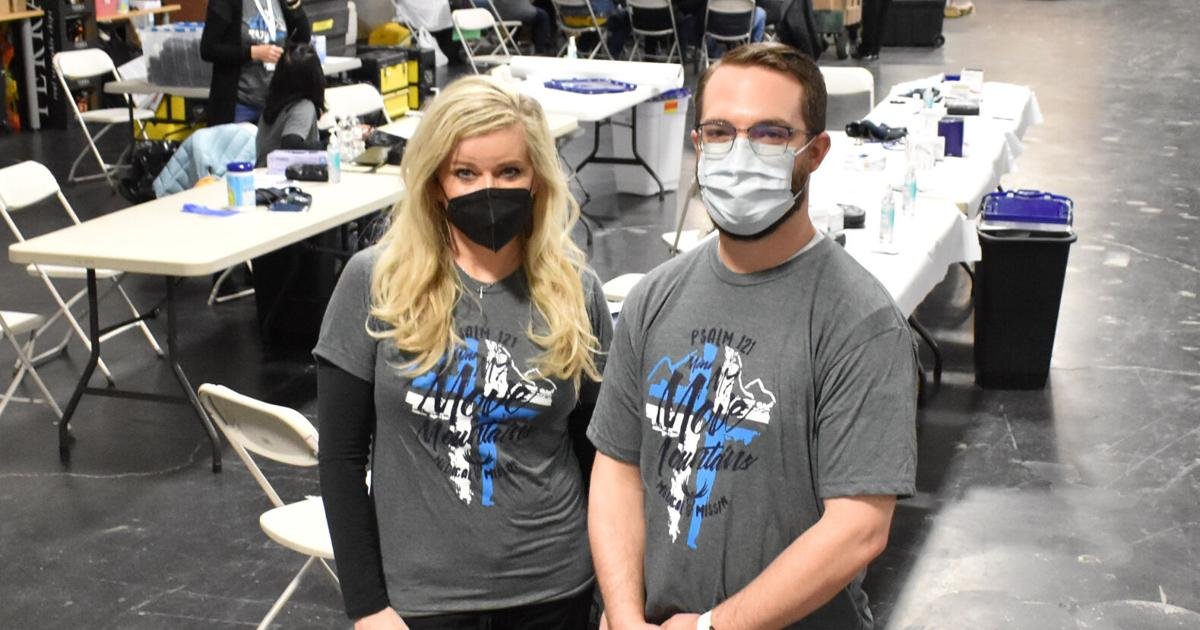WISE — Zion Family Ministries’ activity and kitchen spaces were busy on Wednesday as the Health Wagon got back to business with its annual late winter free clinics in Wise and Clintwood.
Health Wagon President and Executive Director Dr. Teresa Tyson said Wednesday’s event marks a pair of shifts for the more than four-decade-old organization that got its start as a small mobile exam van based in Dickenson County.
Wednesday’s clinic was the first of the late winter events since 2019, when COVID-19 forced Health Wagon staff to stop mass events for fear of the disease’s spread, Tyson said.
While the organization continued with smaller community visits and appointments at its Wise and new Clintwood main offices, she said the past two years have been a balance between public safety and continuing to serve a region facing a range of health care challenges.
Tyson said the clinic’s new name — Move Mountains Medical Mission — also marks a rebranding after two decades working with Tennessee-based Remote Area Medical on annual summer free clinics in Wise County. RAM officials in 2019 acknowledged that the Health Wagon had developed a range of partnerships and regional support allowing RAM to support other health care efforts across the U.S.
COVID-19 screening was the first step for patients at Zion Family Ministries on Wednesday, but Tyson said that was not the only stage for dealing with the disease.
“One of the many things we’re doing is giving COVID shots and boosters and flu shots,” Tyson said. “The Coeburn Economic Development Authority gave us $500, and we’re using that to incentivize people to get vaccinated by putting their names in a drawing for cash prizes. That really helps because vaccinations are our best defense against the virus.”
Even though Tyson and her staff felt the pandemic situation had become safe enough to resume mass clinics like Wednesday’s event, the clinic and Thursday’s event in Clintwood were advertised as appointment-only by calls to the Health Wagon’s Wise and Clintwood offices. Tyson said the new system has helped spread out people onsite for health and safety.
While a pre-pandemic clinic would draw 150 to 200 people for services including physical exams, chest X-rays, pap smears, regular vaccinations, ultrasounds, prescription services, Medicare enrollment help and health education, Wednesday’s clinic still saw more than 100 patients.
Local attorney Brett Hall, working as a volunteer runner at Wednesday’s clinic, said he owed it to Move Mountains because Health Wagon medical staff probably saved his life when he contracted COVID-19 a second time despite being vaccinated.
“They were able to give me monoclonal antibodies when I showed symptoms and I was much better the next day,” Hall said.
Dr. Joe Frank Smiddy, who has operated the Health Wagon’s radiology van and provided chest X-ray services for its events, said COVID-19 has added an extra dimension to what had been a longtime focus on helping diagnose the region’s residents with COPD and black lung.
“Before COVID we were dealing with coal workers, COPD and asthma, people with lung fungus and smoking,” said Smiddy. “Immediately, when COVID hit, we knew that some of the COVID patients would have underlying lung disease and we started doing chest X-rays. If we could improve their lung health, they could deal with COVID better if they got it.”
Smiddy said “long COVID” — symptoms that infected patients face after recovering from the disease — pose another challenge for Health Wagon staff and other health care providers. While some long COVID symptoms can be neurological, Smiddy said some symptoms can be treated medically or by exercise and good health practices.
The Health Wagon’s X-ray and lung services can help patients determine if they can return to work or if they may be medically eligible for services such as Medicaid or Social Security disability, Smiddy added.Smiddy and Tyson said that Move Mountains Medical Mission’s partnership with the Virginia Dental Foundation’s Mission of Mercy dental care events in Southwest Virginia will continue. Tyson said the Health Wagon has applied to participate in a summer program where armed forces medical teams practice emergency deployments by offering human medical care and veterinary services for pets. She said the 2019 program was a success, with people coming to get pets treated and vaccinated leading to many getting needed medical care for themselves too.
“We’re excited about what we can do, we’re excited that it’s free health care, and we’re excited that it’s the Health Wagon,” said Smiddy.







